Spectral Mornings By The Pound
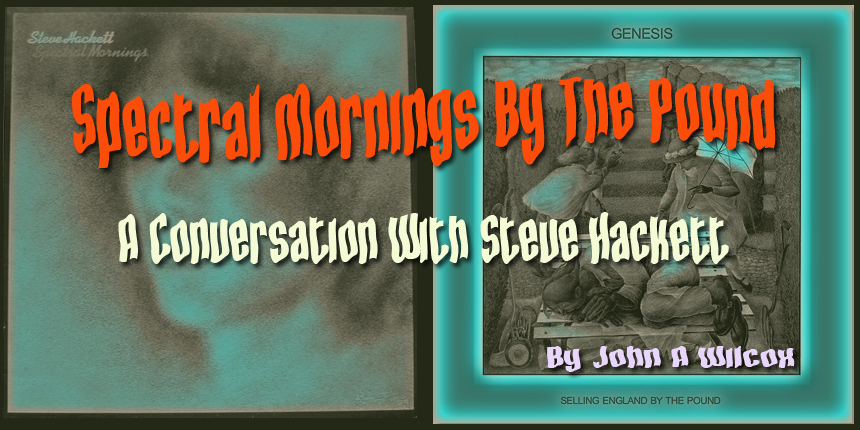
by John A. Wilcox
Steve Hackett is deep into touring mode. He's hit the road with a show featuring the bulk of 1979's Spectral Mornings and the entirety of Genesis' Selling England By The Pound from 1973. Do join Steve and me for tea and biscuits...
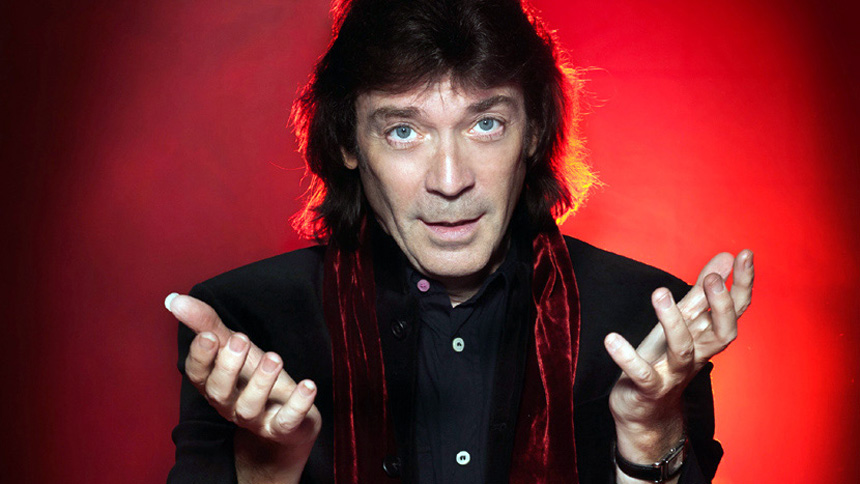
PS: What were the strengths of the Spectral Mornings era band?
SH: I think that they all had extraordinary skills. Dik was a very fine bass player and had been involved in a band called Decameron which specialized in vocal harmonies. I love vocal harmonies. Pete Hicks had a beautiful voice. A little bit like Elton John in a way. There was some kind of quality there. I thought of him more as a kind of ballad singer, but then I also saw him live doing some stuff where he was letting rip and having great fun on stage in Munich. There was something about his presence which was really really good. John Shearer was a fabulous drummer at the time and also a very gifted magician. John, my brother, was playing flute mainly but then he was playing guitar as well. Bass pedals and occasional keyboards. Nick Magnus was really the mainstay in terms of keyboards because the kind of pan-genre approach that I've been involved with going right back to the time of Genesis - there was so much that keyboards did. It was the other orchestra. It was the cement - the kind of foundation of all those bands that had a huge sound and liked their chords to be deep and meaningful and rich. They all had great qualities and they were a fantastic band to be touring with. Both the old stuff that was written before them and the stuff that we really wrote together in rehearsal rooms. It was a great time and the audiences were really fantastic. At that time they were really up for pretty much anything that we were about to give them. So Spectral Mornings was a very very happy memory for me.
PS: What are the strengths of the current band tackling that material?
SH: It's a different line-up. We have Roger King on keyboards who is extraordinary. He's an extraordinary engineer and producer as well as fine keyboard player and arranger and a great modeler of sounds. I think he has a great understanding about the detail about what various things can do. Not just rock instruments but orchestral instruments. He's been involved in a couple of blockbuster movies that were huge that he was involved with doing most of the music for. He's a kind of all rounder. He was trained as a cathedral organist at one point but then moved into engineering and rock & roll and all the rest. I think each of the guys that I'm working with has got this kind of dual quality. Rob Townsend, who blows wonderful sax and flute and whistles and all that kind of stuff, he's really a jazz professor. He's a teacher on one level but he's much more than that. Then there's Nad Sylvan who's Swedish who sings the Genesis stuff with us. Tall and blonde with this extraordinary voice. Very very English but at the same time he's Swedish and he recommended his pal Jonas Reingold to play bass with us. Jonas plays with the Flower Kings and he's a fabulous player. He can play any style of bass. Any speed. Craig Blundell is our brilliant drummer and he's been working with Steven Wilson up until recently. Fabulous virtuouso. Ex-Marine. Started off in a marching band. Fantastic drummer!
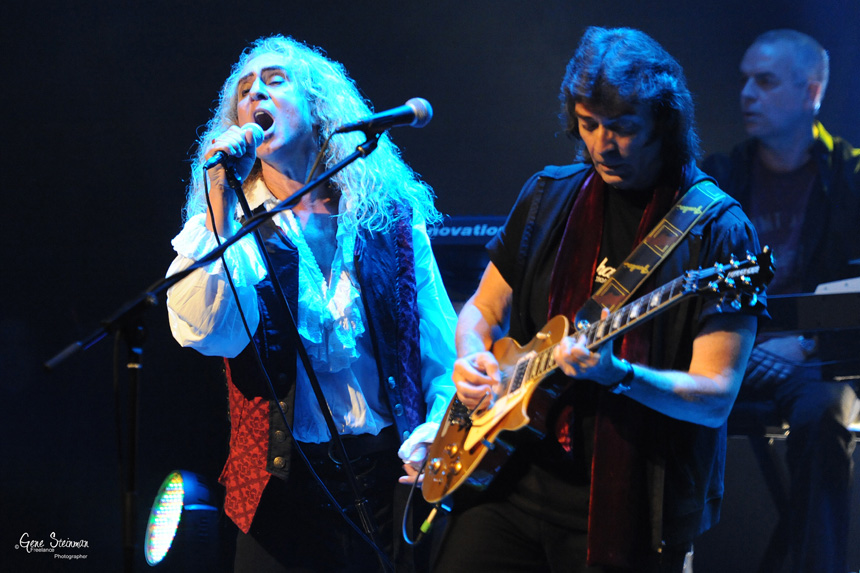
PS: How has Craig changed the dynamic of the band, having taken over for Gary O'Toole?
SH: I think everyone has their strengths. Gary is a great drummer and singer. He wanted to spend more time with his family and with his drum school. I sensed for a long time that although he was giving great performances on stage, he wasn't really happy on the road so we agreed to part company. Now it's Craig Blundell. He's such a fantastic virtuoso.
PS: When you play Tigermoth from Spectral Mornings, is it the vocal version or the instrumental version?
SH: It's the instrumental version. I think what's most robust about the tune is the instrumental passages so we do pretty much the version that we did live back in the day. Although I think the song is interesting lyrically and works well on the album, there's an aspect of it that is almost a drinking song in the officer's mess aspect about it. I think that letting it loose on a rock audience... perhaps if it was part of a musical, somehow that kind of idea of a chorus that talks about people been blown to smithereens - there's a little bit of dark humor there. So it's the instrumental version that I think audiences find easier to digest.
PS: 40 years on, do you still feel connected to the Spectral Mornings album?
SH: Well, actually, it feels really wonderful to do certain things live that I never really did back in the day. We attempted Virgin And The Gypsy back in the day but it didn't really work out. It's much easier now, technology makes it easier to have all those chiming 12 strings and harpsichords. We're able to do that now. We can trigger octaves, we can do various things. So 3 people can sound like the 14 that were chiming away on the original record. We can make that work very well. It sounds and looks very good live even though it's a song that was done on slender threads. It's one of the high points from Spectral Mornings.
PS: There's not a song there that I don't love!
SH: Well thank you! I was very fond of that album and I still love it and it's great to play it again now in front of people.
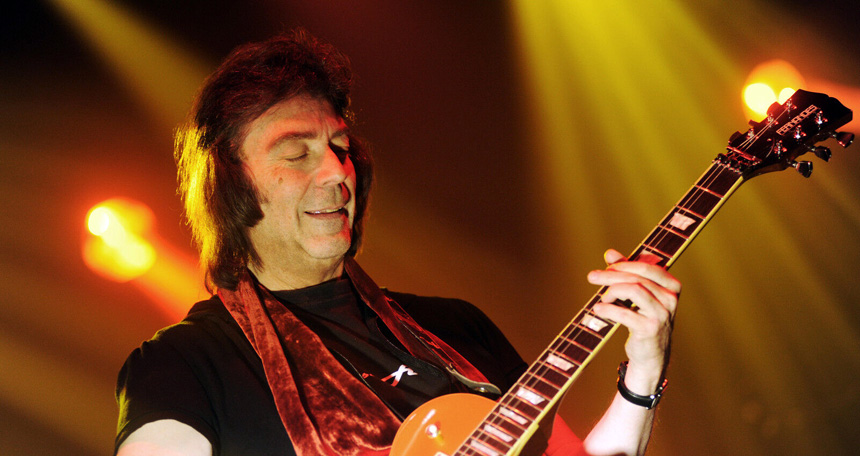
PS: In that 1st set you're also playing several songs from At The Edge Of Light as well.
SH: We do Fallen Walls And Pedestals, Under The Eye Of The Sun, and Beasts In Our Time.
PS: Why those 3 particular songs?
SH: Well I think the fact that they're the early part of the album. It's an album that fortunately charted in 12 territories. It's a difficult choice because I'd already agreed, and it was part of the billing, that I was going to do the whole of Selling England By The Pound plus most of Spectral Mornings, then we had this hit with the latest album. We spend 3 hours on stage to do all of that. It's a tall order for the band but we have a short break in the middle and when we come back we become that other band. We do authentic versions of the Genesis stuff and take it a little bit further than it was with the original album with the inclusion of one of the tracks that Peter Gabriel wanted to do at the time of Selling England By The Pound included like a kind of deleted scene. That works very very well live so welcome to backstage 1973! What was going on in rehearsal rooms, and it was this. So I want to give people the full picture and then some.
PS: Going back to unreleased Genesis numbers, tell me about The Wooden Mask.
SH: That was at the time of Nursery Cryme. It goes that far back. Unfortunately no one had a tape of it. It was potentially very good, but no one has a tape of it so it's kind of up for grabs. Long lost song. It's one of those things - we only recorded a demo version of it but that had a certain quality. It had a certain rough quality to it.
PS: What sort of song was it?
SH: Well, it was a kind of a mid-paced thing. Funnily enough a little bit similar to something I'll be recording today. Same sort of pace to it. Not a million miles away from...quite heavy rock. I think the reason we didn't include it on the album was recording techniques at the time didn't really allow for the thunderous drums that we had in the rehearsal room. Compression really hadn't arrived. Phil's drum sound. Had we had that I think that number would've made it on to an album because it had that kind of cross between something rocky and something that was slightly Ecclesiastical from Tony's fingers on keyboard. That was part of the appeal of early early Genesis. You've got that kind of sacred meets the profane thing. That interesting hybrid which was early Genesis material.
PS: I've always seen Selling England By The Pound as Genesis at the height of their powers, firing on all pistons. Is that a fair assessment?
SH: I think so. I think it's the best Genesis album. I've been in various parts of the world and it's the last thing you expect to hear on the radio and then suddenly you do and you think "Why are they playing this here?" I'm sure they're playing it in Outer Mongolia somewhere. It's a very strange fate that that aspect of something where the band was being as English or as British as possible and at the same time it seemed to find an echo in the most unlikely places. In a way I don't think its day is done. It's still kind of sprouting wings and it's going further.
PS: As you perform it now is there anything within the pieces that you're still discovering?
SH: I think all the time, yes. I discover different ways of playing these things. One of the tapping moments in Dancing With The Moonlit Knight for instance. I was always doing tapping on the first string and I found that if I did that there was always an aspect of the first note - it would be a little bit blurred or the guitar would start to feed back and so over the years I switched it to the fifth string and used it with an octave up and the effect is the same but it's infinitely more reliable. It's a very strange thing but you find out these things as you play something over time.
PS: Is it because of the thickness of the string?
SH: If you're playing it on the first string you've got to be able to damp all 5 of the other strings at the same time, and that's not always easy to do. Very easy in rehearsal but then if you've got an amp that's got any animal quality to it, it's gonna back feed, you're gonna lose it. You've got to be careful with that. It's not so much the thickness of the strings, it's the intermodulation. It's what the pickups are doing all around the other stuff. It's an incredibly live technique. It enables you to play very very fast on 1 string, and you can hop around from string to string and incorporate other things if you want on your right hand. It's a technique that came to me back in 1971. I thought "You can't play faster than this." And it's all being done on 1 string so that's the beauty of it. Once you learn to coordinate it it's a way of doing these kind of machine gun salvos and it's become part of the glossary of terms for heavy metal. So you've got a prototype heavy metal solo there which includes tapping, sweep picking, and octave jumps. All the tricks - a kind of box-of-tricks solo.
PS: I remember when Eddie Van Halen first burst on the scene and thinking "This is not new, this is Return Of The Giant Hogweed!"
SH: Yeah, that's right. With Return Of The Giant Hogweed on Nursery Cryme and also on Musical Box. Those techniques were there earlier, but Eddie is a fantastic guitarist. There's no doubt about that. Doing that with great panache.
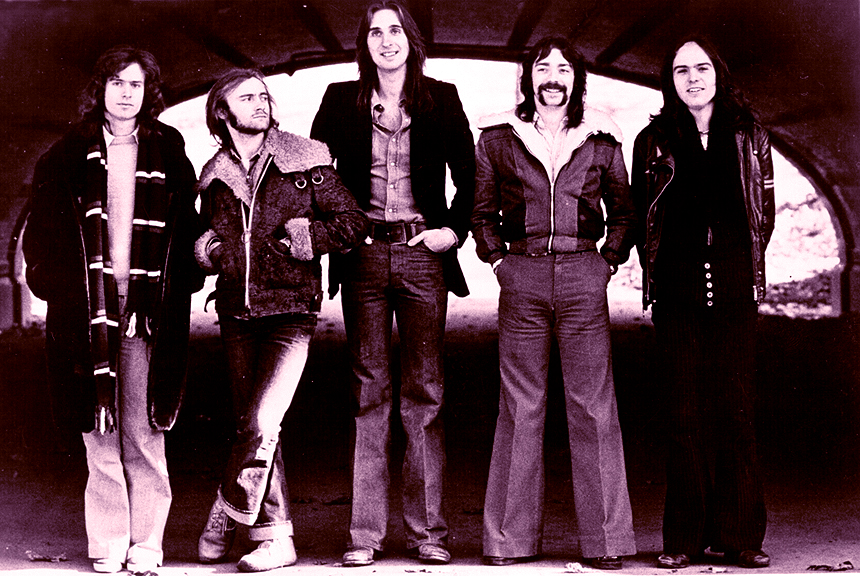
PS: 46 years later, has The Battle Of Epping Forest gotten any easier to play live?
SH: No, I don't think it's ever been easy and all the guys on stage say the same thing. It's slightly easier now. For instance there's a moment when I have to play in time with repeat echoes that the guitar is doing. That's more reliable now. I'm not using a tape echo which would respond differently depending on whether the current was British voltage or what we were getting in America - 112 volts or 110. It's much easier with digital echo. There are no surprises. But it was damned difficult to do when the track was current.
PS: Am I correct in thinking that this tour is the first time you've played it since the Genesis days?
SH: Oh yeah. It's a mere 46 years since I was playing that live. It needed a rest, but it's a kind of grand old dame of its period and it's great to play. It's actually better than ever because we use stuff at the beginning. We use techniques to do the marching section in 7/8. Rob does that and we're using mellotron flutes as well. It's a great effect. It often gets the audience stomping from the word go. There's something about it. Funnily enough I played with a band called Genetics in Argentina and they did it live. We'd retired it as Genesis because we didn't think it worked very well live. It sounded great live and I thought "I ought to be doing this." You know what I mean? At some point. This thing actually sounds really powerful live. But when you're doing it from the stage and you're young guys you've got no idea how this stuff is coming across. It's full of tricky time signatures and it's got the most obscurantic division of things. With things that are fairly simple melody lines but the drums and bass are doing something that is so contrapuntal. Don't try this at home, folks, in your spare time! Don't do the splits like that - it'll injure you! It's the sort of thing where for those people who like their progressive rock to be as difficult as possible - that fits into that category. You're having to think in a different kind of way about the division of time. Itís practically binary, really. I prefer just to feel it and not to count it. That's the way it's easiest for me. Think of it as a piece of music. It's far easier than counting.
PS: How does DejaVu fit into the set?
SH: What we do is we play the whole of Selling England By The Pound and then we play Deja Vu right at the end. I normally tell a little story and say "This is something that was started by Peter Gabriel. I finished it off with his blessing many years later." We recorded it on Genesis Revisited number 1 in the mid 90s with Paul Carrack singing it. When we do it live we've changed the key so that it's closer to the original key that Pete sang it in. It takes on a kind of soulful quality. In some ways it's a very introverted song but it's very much Genesis of then and of now if you could inhabit the 2 time zones separately. You get the feeling of modern technology, modern techniques meets something that's old and authentically Genesis and epic. I'm very proud to be able to do it live. It's not an easy one because it requires the band not to play at certain points while you get a combination of choir and lead singer. And then the band kick in. It's quite something. It took us about a month of doing it live before it really jelled and started to work. When the band's on form it's a really kind of amazing track. It's very personal, but very big. It's been going down a storm.
PS: I understand the evening closes with the 1-2 punch of Dance On A Volcano & Los Endos.
SH: Yeah, that's right.I think we've been doing that mainly for the reason that Los Endos - or my version of it, which features a couple of other things thrown in - it's just got such an all out flat out energy from the word "Go." It's so exuberant. It's like "Hang on to your hat" once you start that. It's always a great feeling. The energy level goes right up to the top. I think that starts with Dance On A Volcano. There's something about that. Difficult time signature but full of energy, full of power. As it should be. A volcanic, orgiastic impossible to play, incredibly fast but we pull it off with this incredible thing the band does and Craig goes absolutely bananas on it towards the end of it. When we were first doing it in rehearsal I thought "We'll never be able to play it at that speed that he's taking it" but actually the band said "No, we really like it like that." I thought "OK, we'll keep it like that. Make it as death defying as possible." So I love playing it, it's a great one. It's like you have an invisible conductor who's changing it from bar to bar where it revs up and you get that charge at the end of it.
PS: I had a surreal moment a few days ago. I was out and the radio followed Bob Seger's Katmandu with... Seven Stones!
SH: Well, I love hearing Bob Seger's voice. It's great. Someone was saying to me back in the seventies that he's an American institution. It's a very emotional voice. It's on the edge the whole time. But to have that back-to-back with something else which purports to be called rock 'n' roll... I think Seven Stones is - how can I put it? In a sense it's really a keyboard piece isn't it? The chord shapes are incredibly classical. The recording of that, the original recording on Nursery Cryme - would that it could have sounded the way that it sounded in the rehearsal room. There's something about the way we rehearsed it that sounded really quite extraordinary. I always thought that it was going to sound a little bit different. Rather more grand than grungy, but I think that the recording is a bit grungy. A bit kind of distorted mellotron. English accordion played by the mellotron circa 1971 with all those tapes that used to distort. It kind of wheezes away. I'm sure there's a better version that could be recorded sometime.
Steve Hackett Live
Tuesday September 24 - Wilbur Theatre, Boston, MA
Wednesday September 25 - The Beacon Theatre, NY, NY
Thursday September 26 - The Ridgefield Playhouse, Ridgefield, CT
Friday & Saturday September 27 & 28 - Keswick Theatre, Glenside, PA
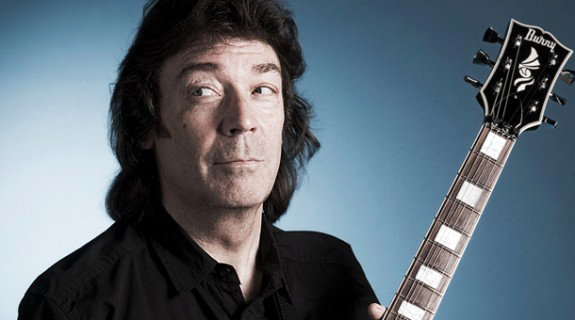
###
All photos are copyright their respective owners.
Table Of Contents
Contact






